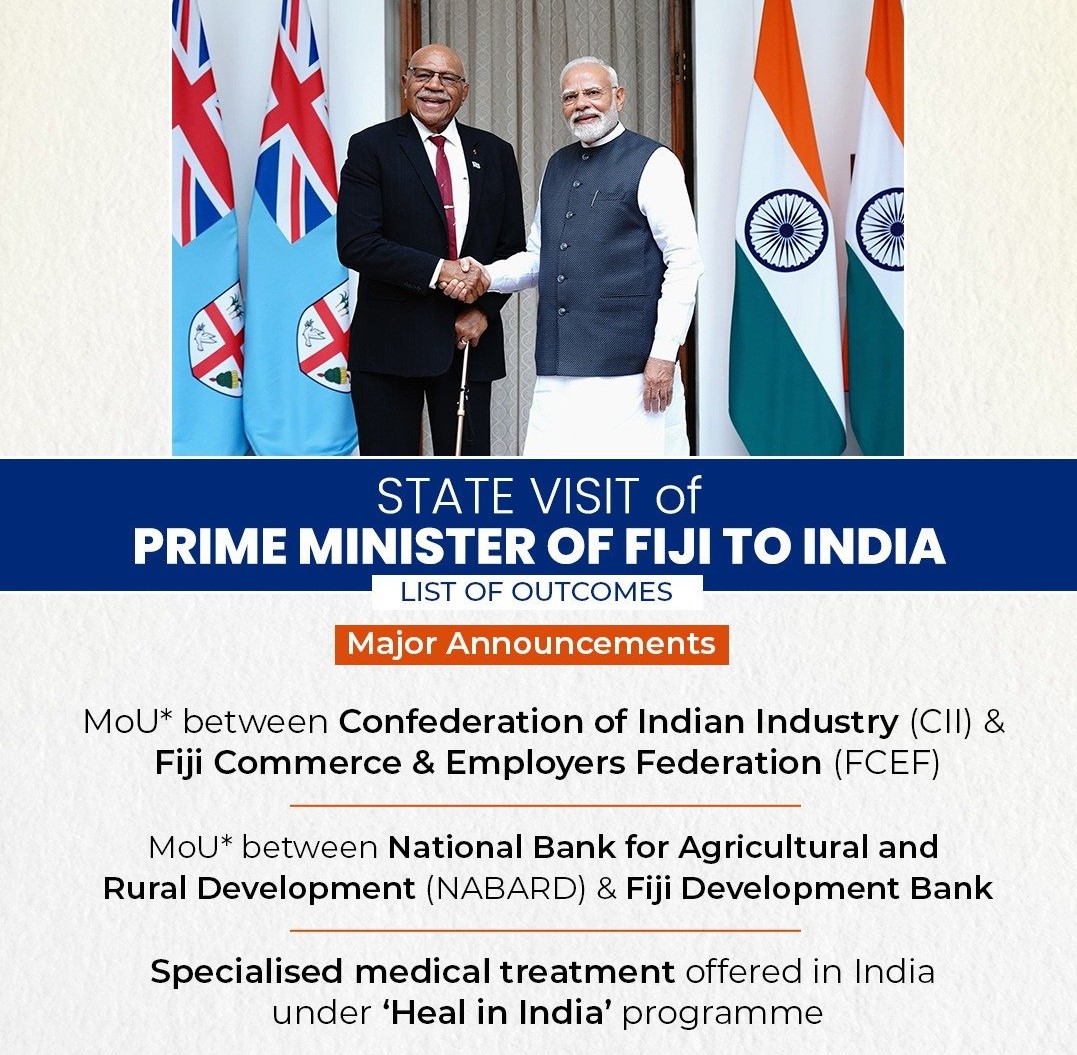Context
Prime Minister Sitiveni Rabuka of Fiji visited India from 24–26 August 2025, at the invitation of PM Narendra Modi and reaffirming the deep-rooted relationship between the two countries. . His visit signals the deepening of India’s engagement with the Pacific Island nations under its Act East and Indo-Pacific policies.
Key Agreements Signed During the Visit:
Healthcare and Pharmaceuticals
· MoU signed for a 100-bed Super Specialty Hospital in Suva, India’s largest Pacific development project.
· Recognition of Indian Pharmacopoeia enables Indian medicines in Fiji, boosting affordable healthcare.
· India to hold a second Jaipur Foot Camp and provide tertiary care for 10 Fijians under the ‘Heal in India’ programme.
Defence and Maritime Cooperation
· Strengthened ties under the 2017 Defence MoU, covering UN peacekeeping, military medicine, white shipping info exchange, and maritime domain awareness.
· Establishment of a Cyber Security Training Cell in Fiji.
· Planned port call by an Indian Naval Ship to enhance Indo-Pacific naval cooperation.
Climate, Energy, and Blue Economy
· Renewed commitment to Mission LiFE and Fiji’s 2050 Blue Pacific Strategy.
· Fiji’s active participation in International Solar Alliance (ISA), Global Biofuels Alliance (GBA), and Coalition for Disaster Resilient Infrastructure (CDRI).
· STAR Centre for solar tech to be established at Fiji National University.
Regional Cooperation and Global South Solidarity
· Commitment to a free, open, inclusive Indo-Pacific.
· Fiji’s interest in joining India-led Indo-Pacific Oceans Initiative (IPOI) welcomed.
· Shared vision of an “Ocean of Peace” endorsed by both leaders.
· Joint support for UN reforms; Fiji backs India’s permanent UNSC seat and 2028–29 non-permanent membership bid.
India-Fiji Relations:
Historical Background
· India-Fiji ties date back to 1879, when Indian indentured laborers were brought to Fiji under British rule.
· India maintained a Commissioner in Fiji since 1948 and recognized Fiji's independence in 1970.
· Fiji established its High Commission in New Delhi in 2004.
Political Relations
· The Forum for India-Pacific Islands Cooperation (FIPIC) was launched in Suva, Fiji (2014), followed by summits in Jaipur (2015) and Papua New Guinea (2023).
· Fiji is an active partner in global platforms like the International Solar Alliance (ISA), Coalition for Disaster Resilient Infrastructure (CDRI), and the Global Biofuel Alliance.
Economic & Commercial Relations
· India's exports to Fiji increased from US $76.28 million (2023–24) to US $84.67 million (2024–25).
· Imports from Fiji rose from US $1.19 million to US $1.54 million in the same period.
· The trade surplus expanded to US $83.13 million, reflecting India's growing presence in the Fijian market.
Significance of Fiji for India:
Fiji's strategic location in the South Pacific makes it a vital partner in India's Indo-Pacific vision, maritime security, and climate action diplomacy.
· Fiji offers a growing market for Indian pharmaceuticals, IT services, and capacity-building initiatives. India supports multiple developmental projects, including solar energy and health infrastructure.
· With increasing Chinese influence in the Pacific, India's defence outreach to Fiji helps balance strategic dynamics in the region. Naval visits and training exchanges enhance interoperability.
· Indo-Fijians make up nearly one-third of Fiji's population. Fiji-Hindi is an official language, and events like Girmit Day commemorate shared history. India's cultural diplomacy, including ICCR scholarships, strengthens people-to-people bonds.
Conclusion:
Prime Minister Rabuka’s visit comes as a turning point in India-Fiji ties, reflecting a move from past estrangement (especially post-1987 coup) toward reconciliation and forward-looking cooperation. With shared colonial legacies, a vibrant diaspora, and growing convergence on global platforms, India and Fiji are poised to become strong partners in a multipolar Indo-Pacific.







